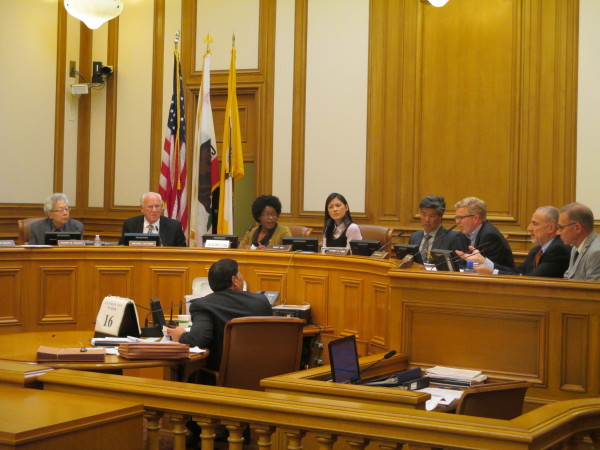
By Tim Redmond
SEPTEMBER 4, 2014 — Supervisor David Chiu has introduced a new version of his Airbnb legislation in response to concerns raised by city planners – but the new bill ignores some of the planners’ suggestions and critics say it’s still way too favorable to the big companies that are making money turning housing into hotel rooms in San Francisco.
Chiu negotiated a deal with the City Planning Commission after a long, long hearing that showed everything that’s wrong with the business model of Airbnb, VRBO and others in the so-called sharing economy.
He asked the panel to approve his legislation, even though a lot of members had concerns, and he promised to include most of their suggested changes in an amended version that will go to the Board of Supervisors this month.
But the new legislation (you can see a PDF here) is still missing some key elements – it include no limits on the number of rooms in a rental unit that can be used as hotels, it has only limited reporting requirements for Airbnb hosts – and perhaps most important, there’s no additional funding for planning enforcement.
Enforcement is critical. Today, the process is entirely driven by complaints; there’s no effort by city officials to track who’s breaking the law. And while the City Planning Department asked Chiu to give planners (as opposed to the Department of Building Inspection) authority to oversee the law, and he agreed, we all know what will happen if there’s no money.
To bill does allow for private civil action – that is, a neighbor can hire a lawyer who can go to court to enforce the rules, and collect attorney’s fees. That may work in some instances, but it’s a cumbersome process that puts the responsibility for enforcing the law on residents, not on the city.
The law would make clear that only “natural persons” – that is, no corporations or LLCs – and rent out rooms as hotels, and that the person renting out the space has to be the permanent resident and live there 275 days a year. That would, of course, get rid of some of the worst abuses.
And, to his credit, he exempted SRO hotel rooms and city-sponsored below-market-rate units so those can’t become tourist hotels.
But in essence, the measure would still rezone the entire city for commercial hotels. There’s no restriction on which parts of town can become hotel districts. There’s no limit on how many Airbnb or VRBO hotels can operate in a single neighborhood. There’s no notice to neighbors when a host applies for a permit.
There’s no mandate that the city post on the web a list of all the places that have permits, so neighbors can see how much hotelization is going on in their communities.
Hotel operators would have to register their units, and that registry would be (mostly) public (with the names of the individual owners or tenants redacted) — but it won’t be posted on the web.
And while the law would (sort of) enforce rent control – a tenant can’t rent out an apartment as a hotel room for more money than he or she is paying the landlord – there’s no rent registration so in effect anyone can charge anything.
Unless, or course, the city goes beyond its passive enforcement and hires a team to do what the mayor doesn’t want: Troll the Airbnb and VRBO websites, look for possible violations, investigate, and crack down.
And, of course, if the city is going to legalize hotel rooms everywhere, there may have to be some discussion of what safety and disability accommodation rules should apply. Hosts would have to certify that their units are up to code – but while a DBI inspection is required for a condo conversion, there’s no inspection requirement for a hotel conversion.
I don’t know; is anyone worried about fire exits, sprinklers – things that are required for hotels but not for individual housing units? Should that be part of the picture?
Chiu isn’t talking to me; too bad, maybe he could clear some of this up.
I spoke with Dale Carlson, who is among those sponsoring a much-tighter set of rules in a potential ballot measure that has 16,000 signatures. He said he thinks the problems in the Chiu bill can be fixed – “but one or two supervisors are going to have to take this on and do a lot of work.” In some ways, Airbnb and its allies might just as soon the whole bill goes down – leaving the Wild West of hotels without limits that’s going on now. Except that Carlson and his allies could quickly put their initiative on the next ballot.
How can we fix this bill? Anyone got productive amendments? Comments are open.





